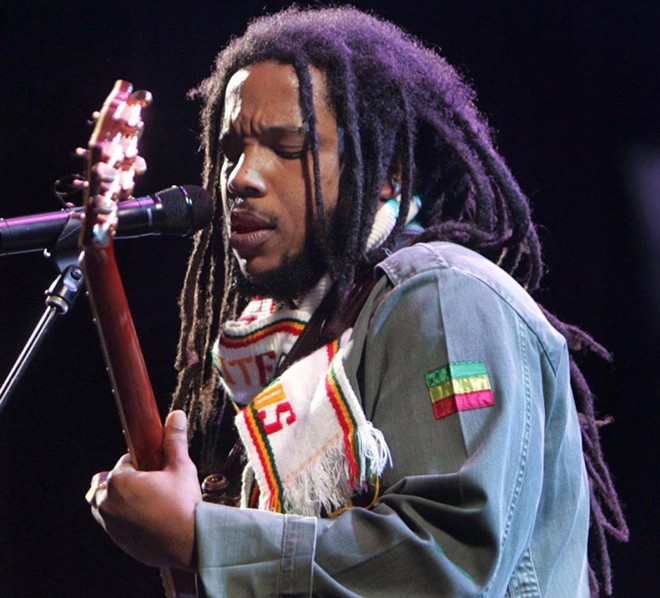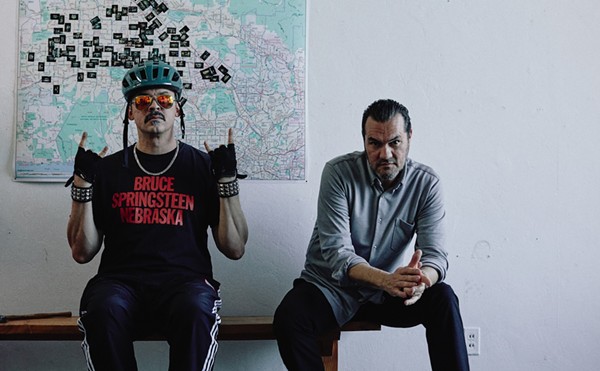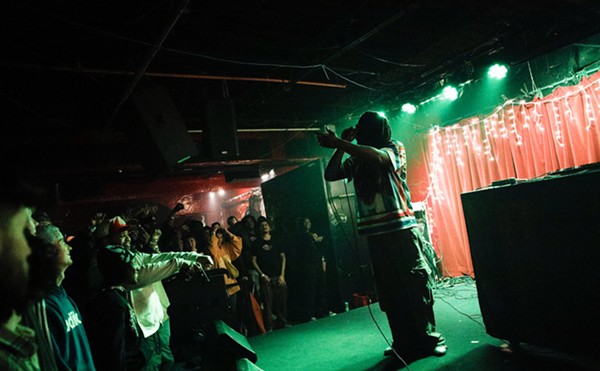In Advance of Sunday's E.J. Thomas Hall Concert, Stephen Marley Talks the Power of Music and His Father’s Legacy
By Breanna Mona on Tue, Oct 30, 2018 at 11:33 am
[
{
"name": "Ad - NativeInline - Injected",
"component": "38482495",
"insertPoint": "3",
"requiredCountToDisplay": "5"
},{
"name": "Real 1 Player (r2) - Inline",
"component": "38482494",
"insertPoint": "2/3",
"requiredCountToDisplay": "9"
}
]
Stephen Marley, 46, is the second son of Bob Marley. The eight-time Grammy winner has rather a calming presence, even via a telephone interview. His speaking voice is as joyous as his singing voice and both are hauntingly similar to his father’s.
But it’s not only his father’s voice that Marley echoes. Stephen and his older brother Ziggy Marley founded Ghetto Youths International Foundation in 1993 to carry on their father’s humanitarian efforts.
Today, many of the Marleys – and there’s quite a few of them – are musicians who often perform their father’s songs, which Marley explains as an “automatic” phenomenon for the family that’s “embedded” in their DNA.
He'll perform an acoustic set of his forward-thinking reggae at 8 p.m. on Sunday at E.J. Thomas Hall in Akron.
Do you think music can be healing? Particularly in such tense political moments like the one we’re in?
Yeah, I know for a fact it is healing – not can be. It is healing, you know, if you allow it.
Your music, like your father's, is very socially conscious. Do you think more artists should make conscious music?
Yeah, I think that anyone who has influence, you know, has a responsibility to use that influence in the right way, do you know what I mean?
Yeah, that was actually my next question. Do artists have a responsibility to use their platform?
Yes, I definitely think it’s a responsibility.
What is the biggest career highlight for you so far? Do any special moments stand out?
That’s a good question. I’ve been on stage with my dad; that’s still the most cherished event for me. I was with him in Zimbabwe in 1980 on stage. That’s one for the record.
How old were you?
In 1980, I was 8.
Is that memory still vivid?
Oh, yes. You know, losing the presence of your dad, you tend to hold on to all memories in that sense. Every memory is embedded in you. That [memory] was very significant. It was my first time going to Africa. It was an experience of life that’s defining, in a sense, of the power of music.
This will sound like a silly question now, but does your father’s legacy inspire you when you’re making your music?
Yes, it definitely inspires me. It's [Bob Marley’s music] embedded in you, through DNA and all of that type of jazz, you know?
Your children make music too?
[Laughs] yes.
Are there any Marley descendants who are not musically inclined?
I mean… everybody makes music. Some people — that’s not their profession, and that’s not their career. My brother Rohan, for example, he is an athlete and he played American football and then as well he is an entrepreneur. He has the coffee. He has so many different businesses going on.
But he doesn’t play music?
No, that’s not his career. Sometimes he plays the drums. But it’s not his profession.
This is an acoustic show, correct?
It’s an acoustic show, you know, I’ve got a few musicians with me, but it’s all acoustic.
What inspired you to make this an acoustic show?
I have an acoustic album that won a Grammy. So ever since that album, people have been loving the acoustic set. It’s quite different than a full-blown band set, you know? It’s a different vibration. It’s a bit more intimate. We sit around and play the guitar and sing. It’s a great vibe, so people like it.
You and Ziggy founded Ghetto Youths International Foundation back in ’93. How did that come about?
The foundation really is an extension of our father’s efforts, you know? For us, as you mentioned our father’s legacy, he was always giving to those less fortunate, those who don’t have the opportunities as others. Ghetto Youth Foundation is a platform we use to do all our charity type of work.
So, during this set, we’re obviously going to hear the album which won you one of your Grammys. Will you play any of your father’s songs as well?
Oh, of course. Most certain. My father’s spirit is in us and you can try to get away from it, but you live with it. Bob always comes out of us. It’s automatic for us to touch on our father’s songs. He’s our greatest teacher in that sense of life. He’s still our mentor.
What’s next for you? Do you have plans for new music?
Yes. In December I will go back in the studio and present something for next year, summer time. It’s always exciting. New music is like new relationships. You’re so in love with the music.
But it’s not only his father’s voice that Marley echoes. Stephen and his older brother Ziggy Marley founded Ghetto Youths International Foundation in 1993 to carry on their father’s humanitarian efforts.
Today, many of the Marleys – and there’s quite a few of them – are musicians who often perform their father’s songs, which Marley explains as an “automatic” phenomenon for the family that’s “embedded” in their DNA.
He'll perform an acoustic set of his forward-thinking reggae at 8 p.m. on Sunday at E.J. Thomas Hall in Akron.
Do you think music can be healing? Particularly in such tense political moments like the one we’re in?
Yeah, I know for a fact it is healing – not can be. It is healing, you know, if you allow it.
Your music, like your father's, is very socially conscious. Do you think more artists should make conscious music?
Yeah, I think that anyone who has influence, you know, has a responsibility to use that influence in the right way, do you know what I mean?
Yeah, that was actually my next question. Do artists have a responsibility to use their platform?
Yes, I definitely think it’s a responsibility.
What is the biggest career highlight for you so far? Do any special moments stand out?
That’s a good question. I’ve been on stage with my dad; that’s still the most cherished event for me. I was with him in Zimbabwe in 1980 on stage. That’s one for the record.
How old were you?
In 1980, I was 8.
Is that memory still vivid?
Oh, yes. You know, losing the presence of your dad, you tend to hold on to all memories in that sense. Every memory is embedded in you. That [memory] was very significant. It was my first time going to Africa. It was an experience of life that’s defining, in a sense, of the power of music.
This will sound like a silly question now, but does your father’s legacy inspire you when you’re making your music?
Yes, it definitely inspires me. It's [Bob Marley’s music] embedded in you, through DNA and all of that type of jazz, you know?
Your children make music too?
[Laughs] yes.
Are there any Marley descendants who are not musically inclined?
I mean… everybody makes music. Some people — that’s not their profession, and that’s not their career. My brother Rohan, for example, he is an athlete and he played American football and then as well he is an entrepreneur. He has the coffee. He has so many different businesses going on.
But he doesn’t play music?
No, that’s not his career. Sometimes he plays the drums. But it’s not his profession.
This is an acoustic show, correct?
It’s an acoustic show, you know, I’ve got a few musicians with me, but it’s all acoustic.
What inspired you to make this an acoustic show?
I have an acoustic album that won a Grammy. So ever since that album, people have been loving the acoustic set. It’s quite different than a full-blown band set, you know? It’s a different vibration. It’s a bit more intimate. We sit around and play the guitar and sing. It’s a great vibe, so people like it.
You and Ziggy founded Ghetto Youths International Foundation back in ’93. How did that come about?
The foundation really is an extension of our father’s efforts, you know? For us, as you mentioned our father’s legacy, he was always giving to those less fortunate, those who don’t have the opportunities as others. Ghetto Youth Foundation is a platform we use to do all our charity type of work.
So, during this set, we’re obviously going to hear the album which won you one of your Grammys. Will you play any of your father’s songs as well?
Oh, of course. Most certain. My father’s spirit is in us and you can try to get away from it, but you live with it. Bob always comes out of us. It’s automatic for us to touch on our father’s songs. He’s our greatest teacher in that sense of life. He’s still our mentor.
What’s next for you? Do you have plans for new music?
Yes. In December I will go back in the studio and present something for next year, summer time. It’s always exciting. New music is like new relationships. You’re so in love with the music.
Tags:
SCENE Supporters make it possible to tell the Cleveland stories you won’t find elsewhere.
Become a supporter today.
Scroll to read more Music News articles
Newsletters
Join Cleveland Scene Newsletters
Subscribe now to get the latest news delivered right to your inbox.












